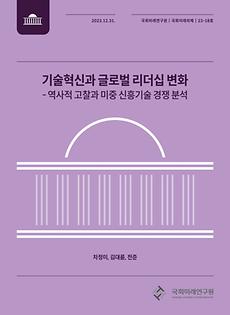
The history of technological innovation and hegemonic power shifts shows the dangers of hegemonic inertia, in which an existing hegemonic power is unable to make bold investments in new and emerging technologies while remaining stuck in the inertia of previous technological innovations. Today, the U.S.-China competition is becoming more intense, especially in terms of technological innovation amid the U.S. declaration that it will not lose its technological edge.
This technological innovation competition of great powers leads to a variety of challenges and opportunities for innovative middle powers such as Korea. As an innovative middle power based on technological innovation in specialized fields such as semiconductors and automobiles, today’s innovation competitive order, in which disruptive technological innovations are unfolding, shows that if a middle power such as Korea falls into a crisis of innovation inertia, it may face significant challenges to its competitiveness and status in the process of order change.
Therefore, this study analizes the US-China Competition on emerging technologies based on Australian Strategic Policy Institute(ASPI)’ s “Critical Technology Tracker” data. In conclusion, thsi makes suggestions and implications for Korea’s innovation strategy based on the ASPI's analysis and Lewis Mumford's theory on Technics and Civilization.